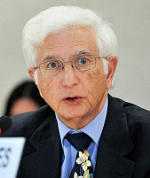In depth
The impact on human rights of a new non-state actor: private military and security companies

José L. Gómez del Prado
Heavily armed and operating in armed or low-intensity conflicts, private military and security companies can easily violate the human rights of civilians. These companies also violate the human rights of the "security guards" they recruit and employ to operate in these confusing situations.
Among the serious human rights violations allegedly committed by private military and security companies that the United Nations Working Group on the use of mercenaries has examined are cases of extrajudicial killings, torture, arbitrary and illegal arrest, human trafficking, discrimination and illness in the population as a result of these companies' activities and attacks on the right of peoples to self-determination. In their desire for profit, private military and security companies do not hesitate to put the safety of their employees at risk or to fail to grant them their most basic rights, placing them in situations of risk and extreme vulnerability.
The scope of this article is limited to highlighting some of the extrajudicial killings that violate the most fundamental right of the individual: the right to life. Despite their involvement in these violations, private military and security companies neither assume responsibility or are accountable to justice.
- On September 16, 2007, employees of the U.S. company Blackwater1 were involved in the incident in Baghdad's Nisoor Square that killed 17 Iraqi civilians and left over 20 others injured, including women and children. The testimonies of numerous witnesses to the incident indicate that arms were used, as well as bullets fired from a helicopter belonging to the company. This is not the only incident in which the company Blackwater has been involved. The company's employees were directly involved in hostilities in Najaf, in April 2004 and on numerous other occasions. To date, nearly eight years after the incident, it has not been punished by any court. There is also evidence of other incidents in which employees of this company have been involved; for example, the incident between forces of the Iraqi Ministry of Interior and Blackwater contractors.
- In central Baghdad, on October 9, 2007, employees of the Australian company Unity Resources Group (URG), who were protecting a convoy, fired at a car carrying two Armenian women, Genevia Antranick and Mary Awanis, killing them. Reports indicate that between 20 and 40 shots were fired against the two women2. The company URG claims that the car carrying the two women was heading for their employees at top speed and did not stop when they received signals to do so3. Genevia Antranick's family, who have not received any compensation, have filed suit against the company URG in a United States court. This same company was also involved in the shooting that killed the 72-year old Australian university professor Kays Juma, as he approached an intersection blocked by a convoy that URG was protecting. According to the company's version of events, professor Juma, who had been a Baghdad resident for 25 years and drove in the city every day, did not stop when signalled to do so4.
The example that best illustrates the consequences that can arise from the activities of private military and security companies is undoubtedly what happened following the killing of four employees of the security company Blackwater by Iraqi insurgents in Fallujah. According to some sources, this took place because to save money, the company failed to provide the appropriate safeguards for protecting a military convoy that needed to pass through an area controlled by insurgents.
That incident dramatically changed the course of the war, and is regarded as the turning point in the U.S. occupation in Iraq. Following that incident the U.S. army, after an initial failed attempt, unleashed Operation Phantom Fury and recaptured the city of Fallujah in November 2004. That operation led to the death of more than 1,350 insurgents. Approximately 95 U.S. soldiers were killed and 560 were wounded. The reports recounting the events of November 2004 mention crimes such as indiscriminate violence against civilians and children5. In 2010, the International Journal of Environmental Research and Public Health, a prestigious medical journal, published a study showing that rates of cancer, infant mortality and leukemia exceed those of Hiroshima y Nagasaki6. More than 300 000 classified military documents made public by Wikileaks, which have received extensive coverage in the international press, show that "the use of private contractors contributed greatly to the chaos of the war in Iraq."
1. Blackwater Worldwide stopped using its discredited name to shed its bad reputation as a result of the incidents in which the company became embroiled in Iraq, and brought together the business that includes about two dozen subsidiary companies under the name Xe.' See Baker, M., "Blackwater dumps tarnished brand name", AP News Break, 13 February 2009. See the images at: http://www.google.com/images?q=nisour+ square&hl=en&rlz=1D2WDIA_enFR388FR389&um=1&ie=UTF-8&source=univ&ei=-IVBTbW8EIao8APA6rlT&sa=X&oi=image_result_ group&ct= title&resnum=12&ved=0CHwQsAQwCw&biw=981&bih=568. (Back)
2. URG, an Australian company, uses many former Chilean soldiers to provide security for the Australian Embassy in Baghdad. One of these Chilean guards recently shot himself. See ABC News and La Tercera (Chile), September 16, 2010. (Back)
3. Cases referred to in the Report of the United Nations Working Group on claims submitted to the Human Rights Council, A/HRC/7/7 / Add.1. (Back)
4. Mendes, J., and Mitchell, S., "Who is Unity Resources Group?", ABC News Australia, 16 September 2010. (Back)
5. 2005 documentary film, "Fallujah, the Hidden Massacre". (Back)
6. Wikipedia (Back)